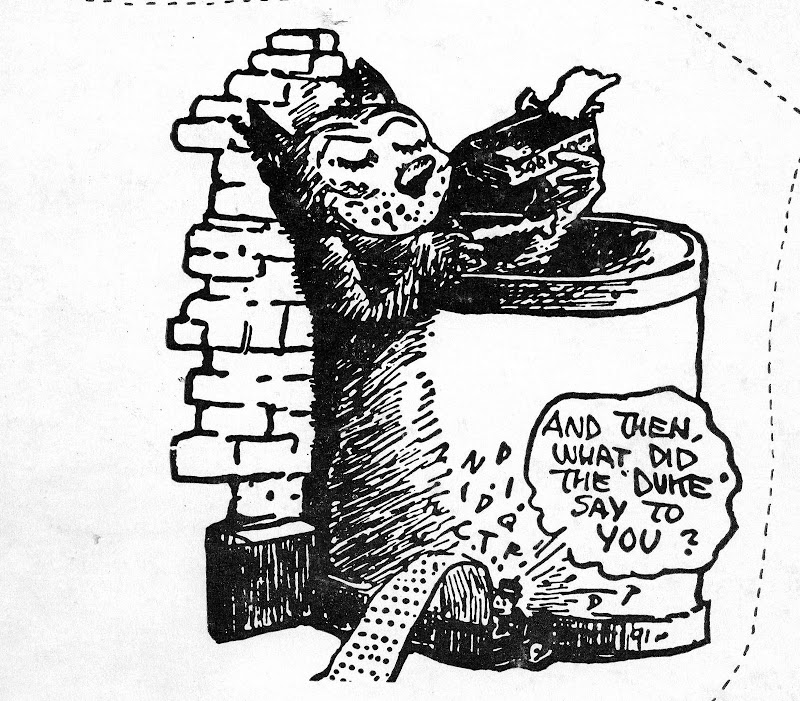
drawing by George Herriman, from the book The Lives and Times of archy & mehitabel
TO THE LOCAL CAMP ROSE PLAYERS Saturday night, there to see archy & mehitabel in shinbone alley. I set the title in lower case in tribute to the lead character archy, the miserable cockroach hero of Don Marquis's collection of columns from the old New York Sun, who hurls himself headfirst to the typewriter keyboard every night, ghost-writing Marquis's column painfully (and unable to operate the shift key), because, as he says in his first missive,
expression is the need of my soulThe columns appeared in the months before the United States joined the First World War, at a time when vers libre and the Armory Show were introducing New York to Modenism, when New York was high on energy and pregnant with cynicism but still fraught with sentimentality.
In 1940 a collection of Marquis's work appeared as The Lives and Times of archy & mehitabel (Garden City: Doubleday Doran & Co.), to considerable success, and in 1954 (probably in the rush of enthusiasm following the emergence of the 12-inch "LP" record) Columbia Records released a "concept album" musical adaptation with a book by Joe Darion and Mel Brooks and music by George Kleinsinger. The cast featured Eddie Bracken as archy and Carol Channing as mehitabel: their songs and philosophical conversation was stitched together by continuity narrated by David Wayne.
I suppose the musical's place in history will be its priority to Andrew Lloyd Webber's Cats, which made the T.S. Eliot estate rich but did little, in my opinon, to further the musical as an art. I first heard the Darion-Kleinsinger recording shortly after it was released, and before it was expanded into the full-length musical that opened in 1957, with Eartha Kitt replacing Channing. The LP was a favorite of our friend Gaye's, and I must have heard it repeatedly in the apartment she shared with Lindsey and a couple of other girls in the year we were courting. It inspired me to give Lindsey a copy of Marquis's book on our first, poverty-struck Christmas, in a ratty edition printed during World War II:
This book is complete and unabridged, manufactured under wartime conditions in conformity with all government regulations controlling the use of paper and other materials(those were times when society, through government, took its public activities seriously and respectfully.)
So we looked forward to hearing the musical, and Gaye lent us LP (somewhat worn, it must be said), and Kleinsinger's wonderful melodies and Marquis's sensitive if sometimes sentimental poetry have been in my ears these last few days. Mehitabel, for example:
i know that i am boundand then her tomcat Bill:
for a journey down the sound
in the midst of a refuse mound
but wotthehell wotthehell
persian pussy from over the seaWell, it's nearly a hundred years since archy first hurled himself headfirst to that letter e, and the cynical Bohemianism, the insouciant big-city back-alley wotthehell is perhaps a little dated. Indeed The Lives and Times of archy & mehitabel closes with a few prescient lines in which archy relays what the ants are saying:
demure and lazy and smug and fat
none of your ribbons and bells for me
ours is the zest of the alley cat…
we would rather be rowdy and gaunt and free
and dine on a diet of roach and rat
…america was once a paradiseIt was about the time that James Thurber released his illustrated book The Last Flower, the first book I remember reading, about an earth blasted by war and fatigue; and it was the time, the early 1940s, when the Limited Editions Club published a book-length poem by either William Rose Benét or his brother Stephen Vincent, a book whose bleak descriptions of insects and robots eradicating humanity scared hell out of me in my early adolescence.
of timberland and stream
but it is dying because of the greed
and money lust of a thousand little kings
who slashed the timber all to hell
and would not be controlled
and changed the climate
and stole the rainfall from posterity
and it wont be long now
it wont be long
till everything is desert
…
ants and scorpions and centipedes
shall inherit the earth
Needless to say, Shinbone Alley lacks all element of scariness. The musical is I think necessarily more discursive, less focusse, than the original LP, but it sure is worth knowing. (I'm told a film version is pretty lame.) Camp Rose, on the river side of Healdsburg's Fitch Mountain, is a rambling frame building whose lowest floor — I don't want to call it a basement — houses a low-ceilinged theater seating thirty-six, with a wide, shallow stage perfect for revues and musicals.
There the Camp Rose Players have been putting on shows for over thirty years, if I read their website correctly. It's community theater with all its flaws and heroic features, and the features get the better by far. The night we went Cheryl Kopczynski, as mehitabel, was recovering from a bad cold, not up to speed, rewarding nevertheless for her laconic impersonation. Bill Garner was a fine, engaging, pathetic little cockroach; Warren Weston a perfect theater cat; John Guilfoy nicely threatening as Big Bill, and the minor characters and chorus well individuated and personable. And the costumes, by Anna Settle, were quite wonderful: no glitzy Cats stuff here, but believable back-alley enterprise.
We'd been looking forward to seeing this for a long time, and Camp Rose did not let us down. Gaye's LP is now safely on my iTunes, the book's down from the high shelves, and what with Geert Mak's In Europe, the return to Gertrude Stein, and last night's reading of Réné Daumal's Mount Analogue, I'm plunged back into the entre-les-guerres: may we all soon in fact enter another such period. (This "downturn" begins to look like a real Depression: maybe we will!)
No comments:
Post a Comment